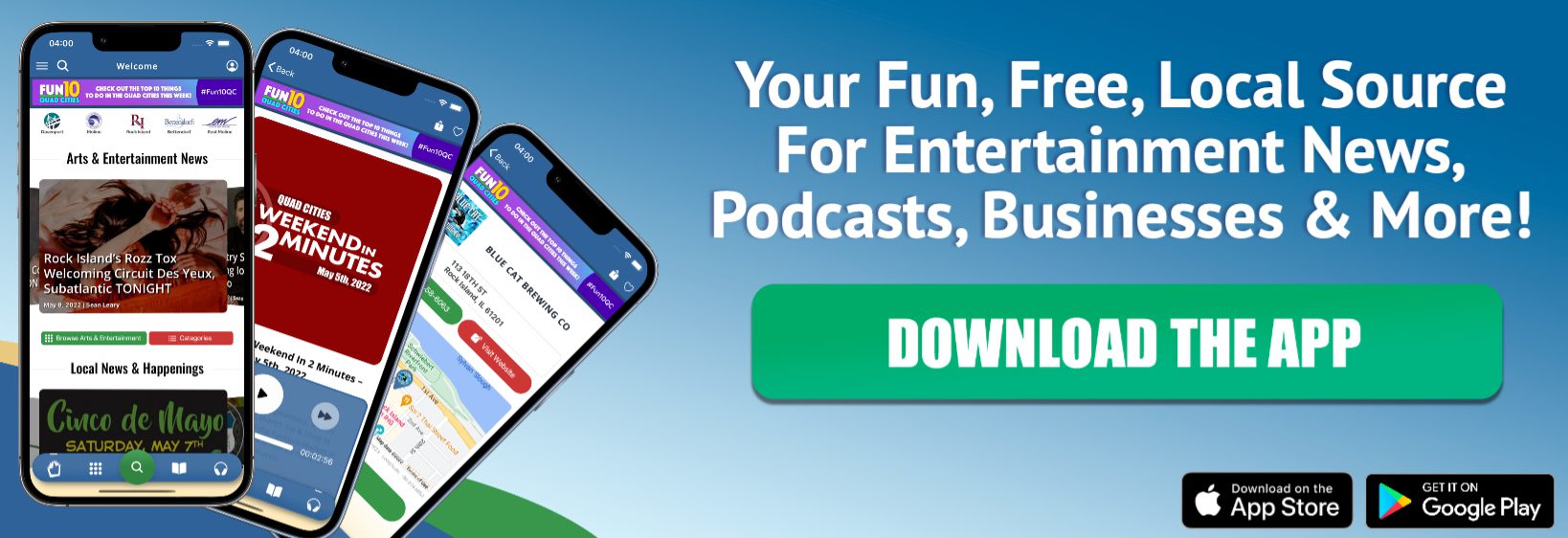Quad-Cities Leaders React to LGBTQ Issues During Pride Month
At a time of unprecedented economic, racial, social and health upheaval, some Quad-Cities LGBTQ leaders are taking comfort in the recent U.S. Supreme Court decision on workplace civil rights. But during Pride Month, they say much still needs to be done.

Michelle Royal
“It’s the most important LGBTQ decision to date,” Michelle Royal of Moline, a transgender activist and vice president of QC Pride, said this week of the June 15 high-court ruling that the Civil Rights Act of 1964 protects employees against discrimination because of their sexual orientation or gender identity.
“It’s better than marriage equality,” she said. “With marriage equality, you could get married on a Sunday and fired on Monday.”
The new 6-3 ruling – with the majority opinion written by Republican appointee Neil Gorsuch – “basically gives equal rights for the LGBTQ in the workplace. There’s still a long ways to go, don’t get me wrong. But it’s showing that civil-rights cases stand 60 years later.”
The case, Bostock v. Clayton County, Georgia, focused on Gerald Bostock, who was fired after he expressed interest in a gay softball league at work. The lower courts followed the Eleventh Circuit‘s past precedent that Title VII did not cover employment discrimination protection based on sexual orientation.
Arguments were heard last October, alongside R.G. & G.R. Harris Funeral Homes Inc. v. Equal Employment Opportunity Commission, a similar question of Title VII discrimination under the Civil Rights Act relating to transgender persons.
On June 15, 2020, the Supreme Court ruled (including Chief Justice John Roberts in the majority) in all cases that discrimination on the basis of sexual orientation or gender identity is also discrimination “because of sex” as prohibited by Title VII.
“Having the Supreme Court validate that the Civil Rights Act includes protection for sexual orientation and gender identity is crucial to allowing LGBTQ individuals to live into their full potential and be considered equal members of this great nation,” said Jay Wolin, minister of the Davenport-based Unitarian Universalist Congregation of the Quad-Cities, who’s worked on local LGBT issues.
“Whenever there is a justice movement such as LGBTQ rights that achieves something, we must always be concerned with resistance to that success,” he cautioned.
“It is extremely important to celebrate the success, to continue to promote why it is still an issue and to not become complacent about the success,” Wolin said. “Marriage equality was a watershed event in this country. Since then, conservative groups have been systematically trying to limit and curtail the rights of LGBT individuals.”
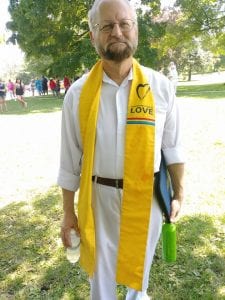
Jay Wolin
President Trump’s executive order denying health insurance to transgender individuals – issued June 12, the fourth anniversary of the Pulse nightclub mass shooting – “was another in a long series of acts of cruelty toward Americans,” Wolin said.
“After the issuance of that order, we waited with trepidation for the Supreme Court ruling on civil rights. The justice on the Supreme Court who was the swing vote allowing marriage equality had retired (Anthony Kennedy) and a more conservative justice had replaced him.”
Prior to the landmark 2015 Supreme Court ruling legalizing same-sex marriage nationwide, it was legal to some degree in 38 states (including Iowa and Illinois), Guam and the District of Columbia. Marriage equality was legal in Iowa following a 2009 Iowa Supreme Court decision, and in Illinois after being passed by the state legislature in 2013.
Prior to the workplace discrimination ruling this week, 21 states (including Illinois and Iowa, the District of Columbia, Guam, and Puerto Rico) had laws that protected against both sexual orientation and gender-identity discrimination in employment in the public and private sector.
“Our country is mostly welcoming, but only to the extent most folks don’t have to get outside of their comfort zone,” said Rich Hendricks, pastor of Metropolitan Community Church of the Quad Cities, and QC Pride board member. “But it is there that personal growth and true friendships are made.”
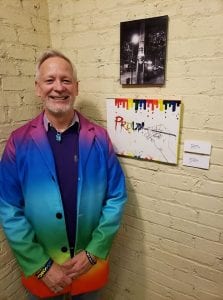
Rich Hendricks
“More LGBTQ people need to be involved in the political process and also in one or more of the many excellent LGBTQ organizations available in the Quad-Cities,” he said. “We are working together to make a more welcoming, inclusive Quad-Cities. Ask how you can help – or at least send a donation, Most importantly, vote – not just paying attention to the national election, but to state and local elections.
The LGBTQ organizations he praised are not only QC Pride, Inc. (which had to postpone this month’s Pride Week events because of Covid-19), but Clock, Inc., The Project of the Quad Cities, Quad Citians Affirming Diversity; Spectrum and a number of diversity groups at local colleges and some high schools.
“There are also some fabulous social justice organizations that are not exclusively LGBTQ, but which work against hate and for a more inclusive community, such as One Human Family QCA and Progressive Action for the Common Good,” Hendricks said.
Illinois came out in front on gay rights
Royal – a transgender female and longtime owner of Rock Island’s Hickey Brothers cigar store and hookah lounge – said Illinois has been a historic leader in LGBT rights. In 1961, Illinois became the first state to decriminalize homosexual acts between consenting adults in private.

Michelle Royal
Since 2006, with amendments to the state’s Human Rights Act, LGBT workers have been able to file complaints with the Illinois Department of Human Rights, a state agency created under the law to handle discrimination complaints.
“Illinois is one of the hands-down best states,” Royal said. “Illinois was one of the states you could not be fired for being LGBTQ.”
A member of Equality Illinois’ Community Advisory Group, she said the Supreme Court decision was a surprise, mainly because “Gorsuch was appointed with the help of almost $8 million in lobbying money, to make sure he made it through, from a very extreme right-wing party,” Royal said.
“And obviously, they didn’t get their money’s worth. It just goes to show you we may have a swing vote. Actually, we had two there, which was better than we could have hoped.”
“I don’t think they did it for the LGBTQ,” she said of the court. “They looked at the law, and saw the intent was to give people equal rights. Most of the speeches I give in the public setting always start with the Pledge of Allegiance and I stop everybody at the point where it’s ‘and liberty and justice for all,’ ‘cause we don’t have liberty and justice for all.”
“Our Black Lives Matter movement can say that; our Hispanic community can say that; our LGBTQ community can say that,” she said. “We’re chipping away at it. This president thinks he’s trying to stifle things from happening, or creating these things to happen.”
Even with the ruling, “we still have a lot of roads to cover,” Royal said. “We still have to cover fair housing and education, and so much more. But this sets precedence because it shows you that the Constitution meant all.”
“There are so many things this will help push along. The only thing I don’t think it helps push along is the equal rights to be able to adopt or foster children.”
Currently, Iowa and Illinois are among 24 states that prohibit discrimination in adoption based on sexual orientation and gender identity.
On June 12, the Trump administration announced it is eliminating an Obama-era regulation (under the Affordable Care Act) prohibiting discrimination in health care against patients who are transgender. The same day, the Human Rights Campaign said it would sue the Trump administration for exceeding their legal authority and attempting to remove basic health-care protections from vulnerable communities, including LGBTQ people.

The Quad-Cities Pride Parade
Royal said it was no coincidence Trump made the move on the anniversary of the Pulse killings. On June 12, 2016, Omar Mateen, a 29-year-old security guard, killed 49 people and wounded 53 others in a mass shooting inside Pulse, a gay nightclub in Orlando, Fla.
“Even though Trump signed that order, it’s still illegal in Illinois to discriminate for health care,” Royal said of transgender discrimination.
“I think there’s going to be a lot of people, eyes were awakened,” she said of the Supreme Court decision. “Republicans on the fence, go by the rule of the land. If the Supreme Court says it’s OK, I’m going along with it. Find me a Republican who doesn’t have a cousin, a niece, an uncle, who’s gay in their family, and you’re going to vote for laws that harm them. That’s gonna make for a rough Thanksgiving if you ask me.”
“There’s a change, as much as I think there’s a change with the Black Lives Matter movement,” Royal said of the current seismic societal shift. “We’re a tipping point again, like 1969, with civil rights and the Stonewall riots. They have awoken the beast. This president has made people stop being so apathetic and opened our eyes to, we’re heading down the wrong path.”
“This president from day one, has done nothing but attack the LGBTQ. If you ask him, he’s one of the biggest supporters.”
“It was really important, because the transgender piece was singled out, combined the two cases,” she added of the Supreme Court case. “I thought after marriage equality, I thought the LGB forgot about their transgender brothers and sisters. We had to defend ourselves. We were there from day one. It was a transgender person who started the Stonewall riots. We’ve been there to support them and stand alongside them. I just kinda felt we were left out there.”
The importance of June 28
On June 28, 1969, New York City police raided the Stonewall, a gay bar on Christopher Street in Greenwich Village. Gay men and lesbians fought back over four days in what has come to be called the Stonewall Rebellion and was seen as the watershed event that triggered the gay-liberation movement.
“In 1969, with the Stonewall riots, at the time you still had laws on the books, to be homosexual or LGBTQ in any fashion was against the law in many states,” Royal (who manages two Facebook pages, Quad Cities Transgender Resource and Information, and Trans Motivation and Positivity) said.
“Illinois didn’t have that then. For years, if you got outed at work, your life was destroyed and ruined. Ever since then, we’ve done all we could do to fight to get the same freedoms that everyone else had,” she said.
“We must keep moving forward with courage and love in our hearts,” Wolin said. “We must embrace inclusivity, not mere tolerance. We must listen and understand the needs of people who may be different from us. We must continue to be vigilant against forces of hate and bigotry as we promote justice, equity and compassion in human relations.”
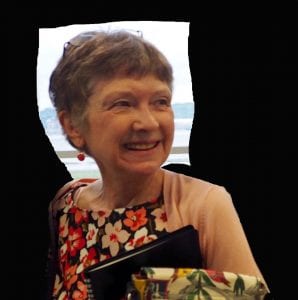
Joyce Wiley
He pointed to the stellar example of Joyce Wiley, a longtime Unitarian who recently died at 80, on June 14. Resident of the Q-C since 1972, she and her husband Jack in 1990 founded a support group for gay and lesbian youth that later became known as Quad Citians Affirming Diversity (QCAD).
She led the group (also known as QCAD: Out For Good) until 2017, when it was passed to Western Illinois University, Moline. During that time, Wiley served hundreds of LGBT youth and adults and was a strong advocate in supporting the efforts that led to the establishment of civil-rights laws protecting the local population.
“She worked to get local ordinances passed barring discrimination and worked actively with the school districts to create Gay/Straight Alliances and promote education on LGBT issues,” Wolin said. Establishing a QCAD center (now at 3300 River Drive, Moline), as a safe space for LGBT youth, was invaluable, he said.
“They could drop in and just be themselves and not feel the pressure of the outside world and even their families, which at that time were not as understanding,” Wolin said. “In a world where people were close-minded, Joyce opened hearts and minds. When I first came to town, I worked on the QCAD Religious Affairs Council and spent time connecting with other clergy throughout the Quad-Cities to spread the message of inclusion.
“Joyce will be deeply missed,” Wolin said. “Her life shows how a person can be an ally and can galvanize a community to change for the better. She is a model for us as Quad-Citians to live our life fully, doing good.”
 An 18-month-old nonprofit, Clock, Inc., has also taken up the mantle to serve LGBT youth, with a focus on June 28.
An 18-month-old nonprofit, Clock, Inc., has also taken up the mantle to serve LGBT youth, with a focus on June 28.
“It is time for change,” says its website, clockinc.org. “LGBT+ individuals deserve a safe and non-judgmental environment to embrace their truth without fear or isolation.”
At its community center at 321 24th St., Rock Island, Clock, Inc. offers community groups, counseling, educational training about this community, workshops, and space for private events.
With so many Pride events being cancelled this summer, the group is inviting the public to celebrate Pride Month by taking its challenge to donate $28 to the organization, in honor of the date of the Stonewall riots. “We at Clock, Inc. recognize the importance of Stonewall, which is why in our logo and on every clock in our center, the hands of time are set to 6:28,” the site says.
Executive director Chase Norris, while completing his master’s in counselor education, started an LGBT+ youth group at his internship site.
Clock, Inc. is needed because “there wasn’t anything that was addressing LGBT youth,” Royal said. “I can tell you from speaking in the high schools and junior highs that there’s a lot of LGBT kids that can’t tell their parents.”
“We needed something like that; we needed a youth center,” she said. “I think Chase has done an amazing job and his board of directors are amazing. They have a pretty well-oiled fundraising machine and the support of Cheri Bustos and Mike Halpin and people like that.”
“They’re doing some amazing things there. And The Project of the Quad Cities is doing amazing things. This fall they’re introducing transgender health care in the Quad-Cities. Most of the transgender community had to go to Iowa City or somewhere else to get their health care. That’s another place that’s doing amazing things.”
The Project plans to expand
At 1701 River Drive, #110, Moline, The Project of the Quad Cities is a community-based organization that was established in 1986 to provide services to those at risk of contracting, affected by or living with STI/HIV/AIDS.
That nonprofit provides education, prevention services, and assistance to clients. This month, The Project is having a virtual silent auction for a planned clinic expansion this fall. You can register now to bid starting June 25, at https://bit.ly/2zunKYO.
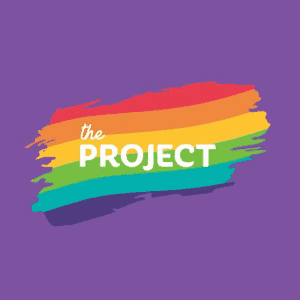 The expanded clinical services will include:
The expanded clinical services will include:
On-site treatment for Hepatitis C
LGBTQ+ primary care for individuals and families
My Identity Care including hormone therapy
TelePrEP and telehealth counseling options
At-home STD testing services
At-home PrEP lab services
The Project says it’s the regional leader in curing Hepatitis C at no cost to the community, and health visits and medications are also provided at no cost.
Bidding for the auction will open at 12 a.m. CDT on Thursday, June 25 and close at 10 p.m. CDT on Sunday, June 28.
Plans for postponed QC Pride Week
Last month, QC Pride announced: “Due to the unprecedented challenges of Covid-19, Pride celebrations around the world have changed. QC Pride is adapting this year’s Unity Pride Week. Currently, the Unity Pride Parade has been moved to a later undetermined date. Events scheduled for June are being re-worked so that we all can celebrate in a manner that is safe for the public.
“QC Pride is working hard to showcase our LGBTQIA+ community and spread the message of inclusiveness to the Quad-Cities and the surrounding area,” they said. “United is how we are getting through these difficult times. The community helps each other mourn our losses, navigate economic hardships, and soften the loneliness caused by isolation. We have been down this road many times before. We are strong. We are experienced. We are ready. We are united.”
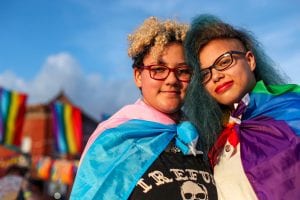
QC Pride photos by Andy Abeyta are on display at the Figge Museum.
QC Pride was founded in 2008 and revived in 2017 with its current board. Its goal is to create a thriving LGBTQ+ community in the Q-C, partly by hosting several events throughout the year, highlighted with the annual Unity Pride Week.
This year, that will likely start with a parade, which crosses the Centennial Bridge, on Sept. 12, Royal said. The main event is planned for Clock, Inc. in Rock Island. “Everything is up in the air,” she said.
“I think the Pride Festival is an important celebration on so many levels,” Wolin said. “First it is a celebration for LGBTQ individuals of their lives and their community. People should celebrate who they are. It is also an opportunity for allies to celebrate with our siblings.
“We need to show our support so the entire community and world can see that we stand together and we are interdependent,” he said. “We must recognize that we are all in this together. And we must be there for other individuals who are historically oppressed in our community. Pridefest is an outward symbol to the world of who we are as a community.”
The Figge Art Museum, 225 W. 2nd St., Davenport, is celebrating Pride Month in a couple ways.
Since early May, it’s offered the first dual virtual and physical exhibit, photos from 2019’s QC Pridefest by Cedar Rapids-based photojournalist Andy Abeyta, in the Figge’s second-floor Lewis Gallery. The museum reopened to the public June 9.
 The exhibit features 11 of Abeyta’s joyous and vibrant images of the Pridefest, part of the QC Pride’s Unity Pride Week. “QC Pride is dedicated to promoting awareness and visibility of the LGBTQ+ community in the Quad-Cities region,” said Tee LeShoure, president of QC Pride.
The exhibit features 11 of Abeyta’s joyous and vibrant images of the Pridefest, part of the QC Pride’s Unity Pride Week. “QC Pride is dedicated to promoting awareness and visibility of the LGBTQ+ community in the Quad-Cities region,” said Tee LeShoure, president of QC Pride.
“At the Figge, we want to celebrate the rich array of voices that make us proud to be a part of the Quad-Cities,” said Vanessa Sage, museum assistant curator. ”Through this exhibition, I hope that everyone will think about what brings us together as human beings and to celebrate what makes us unique.”
The Figge also wants to hear what pride means to you. All community members are invited to submit an image (optional) plus up to 50 words describing what pride means to you by Friday, June 19 — to be featured in the Figge’s virtual celebration of LGBTQ+ Pride Month.
In 50 words or less, explain what Pride means to you, things like: What are some things that you love about yourself and your individuality? What would you like to share and celebrate about your identity with our community? What does LGBTQ + Pride mean to you?
Email an image along with your text, plus your name, and email address to submissions@figgeartmuseum.org by Friday. The Pridefest photo exhibit will be up until Aug. 2.




